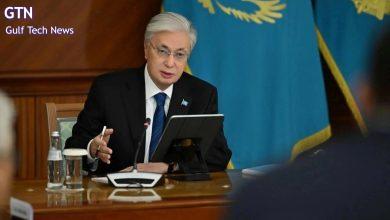Embracing Sustainable AI: A Catalyst for Saudi Arabia’s Vision 2030

In the rapidly evolving business landscape of Saudi Arabia, the integration of technology is becoming a cornerstone of the kingdom’s economic transformation. As part of its ambitious Vision 2030 initiative, Saudi Arabia is not only diversifying its economy away from oil dependence but is also prioritizing technological innovation to drive growth and sustainability.
Data and artificial intelligence contribute to achieving the Saudi’s Vision 2030; This is because, out of 96,66 of the direct and indirect goals of the vision are related to data and AI. The ambitious Vision aims to enhance the Kingdom’s image globally, and develop an economy that has multiple sources of income by supporting non-oil sectors and industries. Saudi AI vision aims to elevate the Kingdom as a global leader in the data-driven economy.
A Vision for Economic Diversification
The Saudi Public Investment Fund (PIF) plays a crucial role in this transformation, aiming to manage $1.07 trillion in assets by 2025. With a strategic focus on emerging sectors, the PIF is set to create 1.8 million new jobs and enhance the kingdom’s innovation capabilities by localizing technology and developing robust telecommunications and media infrastructures. This strategy positions Saudi Arabia as a globally competitive hub for technology.
In 2023, the kingdom launched four new Special Economic Zones (SEZs) designed to boost competitiveness through favorable regulatory frameworks, sector-specific incentives, and integrated government services. These initiatives not only aim to attract investment but also promise a high quality of life that meets global standards.
Last November, for instance, Saudi Arabia launched an ambitious artificial intelligence (AI) initiative, with plans to allocate up to $100 billion (SR 376 billion) to build a technological hub within the country, according to Bloomberg sources familiar with the matter.
Named ‘Project Transcendence’, the initiative aims to drive the development of AI through investments in data centers, startups, and other critical infrastructure. In addition to infrastructure development, the project will focus on attracting global talent and incentivising tech companies to establish a presence in Saudi Arabia.
This strategic move is part of the kingdom’s broader efforts to position itself at the forefront of global AI innovation, mirroring the success of initiatives like the Alat sustainable manufacturing fund, which is similarly backed by $100 billion in capital from Saudi Arabia’s Public Investment Fund (PIF). The project is expected to bolster the country’s role as a major player in the rapidly advancing field of artificial intelligence.
AI: The Road To Digital Excellence
With the establishment of the SDAIA (Saudi Data and Artificial Intelligence Authority) in 2019, the Kingdom actively started exploring AI strategies for its economic future with the drive towards harnessing the potential of data and AI.
The foundations of the initial steps placed in 2019 has been influential towards economic diversification, especially with AI technology being currently leveraged for both government and the public sector. The Kingdom has come a long way with its implementation of AI technology, which has also resulted in making them one of the pioneers of the technology at a global level, resulting in a rapid pace of digital transformation.
With the Kingdom setting the industry standard for AI technology through its initiative of smart cities such as the massive NEOM project, the Kingdom is pushing boundaries as to how we can progress with emergent technology. The Kingdom’s “Vision 2030” also highlights technology advancements, which envisions AI as a major landmark for economic progress and for pioneering the future of technology.
Sustainable AI: The Heart of Innovation
Central to this vision is the commitment to sustainable AI, which is increasingly recognized as vital for driving economic growth while safeguarding environmental sustainability. The integration of sustainable AI practices into various sectors is seen as a pathway to achieving these dual objectives.
Sustainable AI refers to the development and use of artificial intelligence technologies in ways that are environmentally responsible, economically viable, and socially beneficial over the long term. It encompasses a broad set of principles and practices that ensure AI not only meets current needs but does so without depleting resources, causing harm to society, or creating unsustainable dependencies.
The key aspects of sustainable AI include environmental sustainability, economic sustainability, responsible AI development.
Smart Cities and Sustainable Urban Development
Projects like NEOM and The Line exemplify how sustainable AI can be harnessed to create smart cities. AI technologies are being deployed to optimize waste management, traffic flow, and energy consumption. Riyadh is also evolving into a smart city, leveraging AI solutions to enhance public services and urban development.

Advancements in Agriculture and Healthcare
AI’s application extends into critical sectors such as agriculture and healthcare, where it promotes sustainability. In healthcare, data-driven diagnostics are revolutionizing patient care by predicting healthcare demands and optimizing resource use, thereby fostering a sustainable healthcare ecosystem.
In agriculture, the kingdom’s arid climate has necessitated the adoption of sustainable practices. AI solutions are essential for efficient water management and crop health preservation, enabling farmers to adapt to challenging environmental conditions.
Addressing the Environmental Footprint of AI
As organizations increasingly adopt AI, including generative AI (GenAI), concerns about its environmental impact are rising. According to Gartner’s 2023 CEO survey, 78% of executives believe the benefits of AI outweigh the risks, yet the environmental footprint of AI is a growing concern.
To mitigate these impacts, ManageEngine enables organizations to adopt sustainable AI practices. This includes leveraging existing AI models rather than developing new ones from scratch, which can be energy-intensive. By utilizing pre-trained models and employing techniques such as pruning, quantization, and knowledge distillation, companies can significantly reduce energy consumption.
∙ Pruning minimizes the number of parameters in a model, leading to lower memory requirements and energy use.
∙ Quantization converts model parameters from 32-bit floating-point numbers to 8-bit integers, decreasing memory usage and increasing operational efficiency.
∙ Knowledge distillation transfers insights from larger, complex models to smaller ones, allowing the latter to replicate outcomes without heavy computational demands.
These techniques, which are widely provided by ManageEngine, are especially beneficial in TinyML applications, which enable machine learning on low-powered devices, allowing for efficient data processing without reliance on cloud resources.
“ManageEngine, as a leading IT management division of Zoho Corp, has a mission of empowering businesses to take control of their IT, from security, networks, and servers to applications, service desk, Active Directory, desktops, and mobile devices, making the life easier with software that is feature rich, easy to use, and easy to integrate, giving a comprehensive IT management solution that accelerates digital transformation, and enables remote work”, said –Ramprakash Ramamoorthy, Director of AI Research, ManageEngine.
“As Saudi Arabia strides toward its Vision 2030 goals, the integration of sustainable AI practices will be crucial in shaping a resilient, diversified economy. By harnessing the potential of AI while prioritizing environmental sustainability, the kingdom is setting a global standard for how technology can drive economic growth responsibly. Embracing sustainable AI is not just a trend; it’s a transformative approach that will define the future of business and innovation in Saudi Arabia”, Ramamoorthy added.




